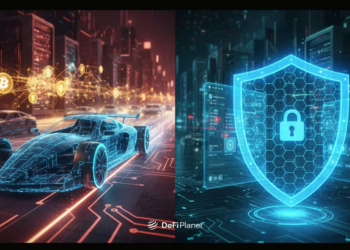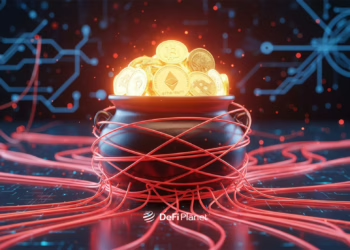Blockchain technology has demonstrated its immense potential in transforming various sectors, including finance, supply chain, healthcare, and gaming, showcasing its ability to revolutionize multiple industries.
However, the increasing adoption of blockchain has highlighted the need to address fundamental challenges such as usability, security, and scalability. As blockchain technology continues to evolve and integrate into different sectors, addressing these core issues has become crucial for its ongoing development and effective integration.
Multi-Party Computation (MPC) wallets have undergone significant evolution, playing a pivotal role in enhancing the security of blockchain systems while simultaneously improving the user experience. This advancement encourages a wider user base to embrace and adopt this pioneering technology for digital transactions.
This article provides a comprehensive overview of MPC wallets. Let’s get started!
What is Multi-Party Computation (MPC)?
Multi-party computation is a cryptographic method where various parties, each having parts of private data, collaborate to compute a specific result using MPC-based algorithms. They combine their data to calculate this result without revealing the details or content of their inputs or any other confidential information in the process.
Put simply, MPC joins together various entities, each with parts of information that, when combined, can unveil a secret, sign a message, or authorize a transaction. Importantly, MPC achieves this without revealing specific details about the information each individual holds.
In MPC, it’s essential to understand that combining data from different participants doesn’t expose the secret itself. Instead, these fragments of information function as inputs for the desired computation. For instance, ff participants share their secret information or break the rules during the computation, the MPC protocol prevents dishonest participants from making honest parties disclose their confidential information or affecting the result’s outcome.
During the protocol’s execution, no one can figure out the secret information of each party. This ensures that the computation result doesn’t provide any clues about the private information held by the participants.
How Does an MPC Wallet Work?
Multi-Party Computation (MPC) is a cryptographic method that enables multiple parties to collectively compute a function without revealing their individual inputs.
In an MPC Wallet setup, the standard private key undergoes a unique process: it’s divided into multiple shares, which are then distributed among different entities, including wallet users or trusted servers.

This approach not only ensures the distributed and secure management of key components but also contributes to enhanced security and flexibility within the wallet system. This distributed approach enhances security by preventing any single party from possessing the complete private key, thus eliminating vulnerabilities.
During transaction signing, collaboration among involved parties allows the generation of a signature without reconstructing the private key, ensuring continuous asset security throughout the process.
When a transaction begins involving parties like the user and the wallet provider’s server, an MPC protocol is used to collectively sign it. Each party holds a portion of the private key, using it to generate their individual signature share. These shares are then combined to create a valid signature for the transaction.
Throughout this process, the private key shares remain concealed, and parties cannot access each other’s shares. This guarantees that if one party is compromised, an attacker cannot gain full control of the wallet or the assets.
Consider three users (X, Y, Z) setting up an MPC wallet. They each create a unique cryptographic key and utilize an MPC algorithm to generate a shared set of cryptographic keys.
These shared keys are then applied to form a distinct wallet address. When a user, let’s say, X, wants to send digital assets from the wallet, they initiate a transaction with their cryptographic key. The transaction is fragmented and sent to other users (Y and Z), who use their respective keys to verify and authorize the transaction.
Once the users validate the transaction segments using the MPC algorithm, they combine them to execute the transaction. Crucially, the cryptographic keys are never shared or disclosed, ensuring that no single user has complete control over the wallet. This security measure guarantees the safety and integrity of the wallet’s operation.
History of Multi-Party Computation
The concept of privacy-focused computation started to emerge in cryptography around 1982. Before that, cryptographers mainly focused on encrypting messages between two parties. However, it was in 1982 that 2-party computation (2PC) laid the foundation for the development of Multi-Party Computation (MPC).
In the 1980s, the exploration of Multi-Party Computation (MPC) began, marking a significant step forward in cryptography. Researchers dedicated their efforts to developing applications that utilized the capabilities of MPC.
Traditionally, cryptography aimed to keep information hidden. With the introduction of Multi-Party Computation (MPC), a different computational approach emerged. MPC doesn’t conceal all information but instead concentrates on hiding specific details while performing calculations involving data from multiple sources.
In the present day, Multi-Party Computation (MPC) serves various practical purposes, such as facilitating digital auctions and bolstering the security of digital assets within MPC wallets. It has become the standard choice for institutions and developers aiming to secure their digital assets while ensuring quick and convenient access to them.
However, it’s important to emphasize that the secure storage and transfer of digital assets rely heavily on continuously safeguarding the private key.
Benefits of Multi-Party Computation Wallet
- Enhanced Security: Adopting a multi-party approach significantly reduces the risk of private key theft or compromise, thereby reinforcing the security level for your digital assets. This improved security not only minimizes potential vulnerabilities but also contributes to the safety and integrity of your digital holdings.
- Privacy: Through threshold signatures, the confidentiality of transaction signing is maintained by preventing a single entity from possessing the complete private key. This not only enhances user privacy but also adds an additional layer of anonymity to transactions, ensuring a more discreet and private experience for users interacting with the system.
- Risk Management: The built-in redundancy and fault tolerance features serve as a safeguard for your assets, shielding them from unexpected events and providing reassurance, particularly for individuals with a long-term investment perspective.
- Inheritance and Recovery: MPC wallets simplify future planning by enabling users to share key components with family members or trusted individuals. This ensures that assets remain accessible even in unforeseen circumstances, offering a practical solution for long-term asset management and recovery.
- Corporate and Institutional Use: Businesses and institutions derive value from employing MPC wallets to protect their cryptocurrency holdings. By distributing key shares among various stakeholders or departments, MPC wallets provide an added layer of security for managing digital assets within the organizational structure.
Understanding the Drawbacks of MPC Wallets
Multi-Party Computation (MPC) does carry certain risks that merit attention. These potential downsides include:
- High Communication Costs: MPC wallets involve extensive communication among the participating parties in the protocol. This improved interaction increases bandwidth usage and network latency for the devices involved. Additionally, this extensive communication elevates susceptibility to network threats such as denial-of-service (DoS) or man-in-the-middle (MITM) attacks.
- Potential Requirement for Technical Expertise: Setting up and managing MPC wallets often demands a higher level of technical knowledge. Users must grasp the secure distribution of private key shares and handle the complexities of the multi-signature process. This requirement might pose challenges for individuals lacking technical expertise or preferring simpler solutions, potentially acting as a barrier to entry for some users.
- Possible Transaction Delays: The multi-signature necessity in MPC wallets could result in slower transaction times compared to single-signature wallets. Coordinating the collection of signatures from different parties, especially across different time zones, might introduce delays.
- Limited Adoption and Availability: Despite their advantages, MPC wallets have not seen widespread adoption, and not all wallet providers offer them. This scarcity can present challenges for users seeking compatible solutions, potentially leading to a lack of support and resources for troubleshooting and maintenance.
In Conclusion,
- In the dynamic cryptocurrency space, security remains paramount. Multi-Party Computation (MPC) wallets have emerged as a groundbreaking solution, tackling vulnerabilities often present in traditional wallets by distributing control and facilitating secure collaboration.
- While they do have certain limitations, the surging appeal of MPC wallets can be credited to their significant advantages, including enhanced security measures, privacy features, and reduced reliance on conventional storage methods.
Disclaimer: This article is intended solely for informational purposes and should not be considered trading or investment advice. Nothing herein should be construed as financial, legal, or tax advice. Trading or investing in cryptocurrencies carries a considerable risk of financial loss. Always conduct due diligence.
If you would like to read more articles (news reports, market analyses) like this, visit DeFi Planet and follow us on Twitter, LinkedIn, Facebook, Instagram, and CoinMarketCap Community.
“Take control of your crypto portfolio with MARKETS PRO, DeFi Planet’s suite of analytics tools.”





















